Revelation: Segment II – Jesus and His Church (Rev. 1:8-3:22)
In paragraphs I & II of this segment we saw a vision of the Heavenly Jesus. Now we will get into letters addressed to each of the seven representative churches.
1. Ephesus (Loveless Church) [Rev. 2:1-7]
2. Smyrna (Persecuted Church) [Rev. 2:8-11]
3. Pergamum (Compromising Church) [Rev. 2:12-17]
4. Thyatira (Immoral Church) [Rev. 2:18-29]
5. Sardis (Dead Church) [Rev. 3:1-6]
6. Philadelphia (Faithful Church) [Rev. 3:7-13]
7. Laodicea (The Lukewarm Church) [Rev. 3:14-22]
Summary
The Letters to the 7 Churches (2.3-2.9)
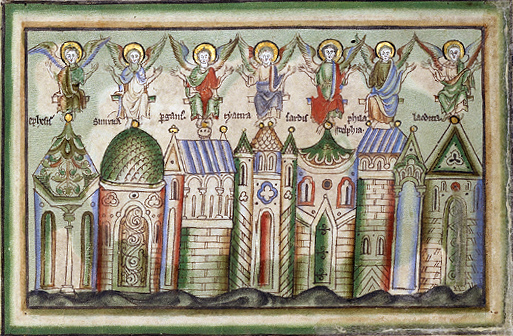
Each letter follows a similar structure. Pay attention to any deviations from this structure, they are significant.
Letter Structure:
- “To the angel of _________ write…”
- A description of Jesus from the vision
- Positive(s) (“I know…”)
- Contrast (“But…”)
- Causation (“Therefore…”)
- “He who has an ear…”
- “To him who overcomes….”
Who is the author & audience of these “seven letters to the seven churches”? Recall, we discussed earlier how each of these 7 churches are representative of the church as a whole. Jesus is sending a message to the church, a COMPLETE message to the church, using these 7 representative churches. “This passage of Scripture was given to John by Jesus not only about seven existing churches at that time, but also about all churches in general and about each of us individually. In other words, these letters are written to all churches of all ages and all individuals in every age.” -Nancy Missler
| 1 | “To the angel of _________ write…” | 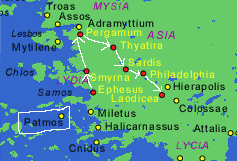 In what order are the churches listed? Essentially by geographic location, starting with the one closest to Patmos, and visiting the rest in a counter-clockwise loop. My observation is that this would be a practical “shortest path” order to visit the churches if John were to actually physically travel to each of these churches, starting in Patmos, and wished not to backtrack along his route. In what order are the churches listed? Essentially by geographic location, starting with the one closest to Patmos, and visiting the rest in a counter-clockwise loop. My observation is that this would be a practical “shortest path” order to visit the churches if John were to actually physically travel to each of these churches, starting in Patmos, and wished not to backtrack along his route. |
||
| 2 | A description of Jesus from the vision | As you look at the descriptions of Jesus and the church, keep in mind that who Jesus is sets the standard for how the church is/should be.
“The title of our Lord in each case accords with the nature of the address, and is mainly taken from the imagery of the vision, Rev. 1:12-16.” -JFB |
||
| 3 | Positive(s) (“I know…”) | “It’s important to also note that seven times in these letters to the seven churches, Jesus says (through John), “I know your works.” In other words, Jesus is emphasizing “works” in these letters…“My works.” Jesus says. He is talking about the things that are done by the Holy Spirit through us. He is not referring to the “works” of the flesh, but to the “works” of the Spirit.” -Nancy Missler | ||
| 4 | Contrast (“But…”) | |||
| 5 | Causation (“Therefore…”) | |||
| 6 | “He who has an ear…” | He who has an ear…hear…what the SPIRIT says… this phrase is repeated in every letter. So lets discuss it now. This is a SPIRITUAL message. The spirit is speaking to you. If this is just theory to you, there hasn’t been personal conviction, you don’t have ears that are listening (and you should be nervous about any decision you’re making) If you’re not spirit led, what are you?
|
||
| 7 | “To him who overcomes….” | “The “rewards of inheritance” that are promised to each of these churches, and to the individuals in them who overcome, apply to all of us. Consequently, we need to listen carefully to what Jesus is saying.” -Nancy Missler |
Here is a summary of the big picture what we’re about to learn in this segment, showing elements 1, 3, & 4 from the structure above:
|
Church |
What Jesus likes about them: |
What Jesus has against them: |
Essentially… |
Should Be… |
| Ephesus | Deeds, toil, perseverance | Left their first love | Loveless | Perfect in love |
| Smyrna | Tribulation | (no bad qualities) | Persecuted | Faithful in tribulation |
| Pergamum | Hold fast in tribulation, don’t deny Jesus’ name | Have bad doctrine mixed in (eg. eat food sacrificed to idols, commit acts of immorality) | Compromising | Accurate in doctrine |
| Thyatira | Deeds, love, faith, service, increasing greatness of deeds | tolerate Jezebel, immorality | Immoral | Zealous for purity |
| Sardis | Deeds, good name | You are dead | Dead | Spiritually Alive |
| Philadelphia | Deeds | (no bad qualities) | Faithful | Consistently biblical |
| Laodicea | (no good qualities) | Lukewarm | Lukewarm | Extreme |
Ephesus (Loveless Church) [Rev. 2:1-7]
(2:1) “To the angel of the church in Ephesus write: The One who holds the seven stars in His right hand, the One who walks among the seven golden lampstands, says this: (2) ‘I know your deeds and your toil and perseverance, and that you cannot tolerate evil men, and you put to the test those who call themselves apostles, and they are not, and you found them to be false; (3) and you have perseverance and have endured for My name’s sake, and have not grown weary. (4) ‘But I have this against you, that you have left your first love. (5) ‘Therefore remember from where you have fallen, and repent and do the deeds you did at first; or else I am coming to you and will remove your lampstand out of its place–unless you repent. (6) ‘Yet this you do have, that you hate the deeds of the Nicolaitans, which I also hate. (7) ‘He who has an ear, let him hear what the Spirit says to the churches. To him who overcomes, I will grant to eat of the tree of life which is in the Paradise of God.’
Breaking this down by the structure above looks like this:
| 1 | “To the angel of _________ write…” | (2:1) “To the angel of the church in Ephesus write: |
| 2 | A description of Jesus from the vision | (1b) The One who holds the seven stars in His right hand, the One who walks among the seven golden lampstands, says this: |
| 3 | Positive(s) (“I know…”) | (2) ‘I know your deeds and your toil and perseverance, and that you cannot tolerate evil men, and you put to the test those who call themselves apostles, and they are not, and you found them to be false; (3) and you have perseverance and have endured for My name’s sake, and have not grown weary. |
| 4 | Contrast (“But…”) | (4) ‘But I have this against you, that you have left your first love. |
| 5 | Causation (“Therefore…”) | (5) ‘Therefore remember from where you have fallen, and repent and do the deeds you did at first; or else I am coming to you and will remove your lampstand out of its place–unless you repent. (6) ‘Yet this you do have, that you hate the deeds of the Nicolaitans, which I also hate. |
| 6 | “He who has an ear…” | (7a) ‘He who has an ear, let him hear what the Spirit says to the churches. |
| 7 | “To him who overcomes….” | (7b) To him who overcomes, I will grant to eat of the tree of life which is in the Paradise of God.’ |
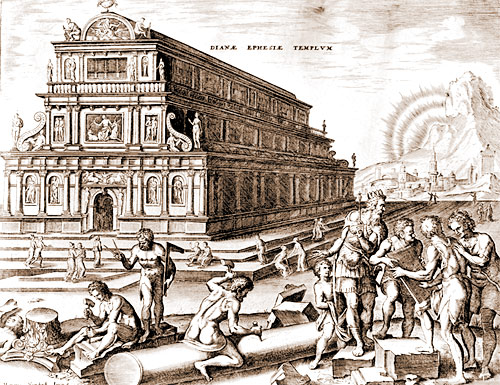
Pagan Temple of Artemis at Ephesus, Maerten Van Heemskerck, Life Magazine 1901
1st letter: to Ephesus. Jesus knows all these great things about them but holds one thing against them. This one thing they’ve left is in opposition to all the good things they are doing.
Rev 2:1 “To the angel of the church in Ephesus write: ‘The words of him who holds the seven stars in his right hand, who walks among the seven golden lampstands. [ESV]
church – εκκλησιας (ekklēsias), “a gathering of citizens called out from their homes into some public place, an assembly” (Thayer’s Lexicon)
![]() Where is Ephesus? Ephesus was the chief city of the province of “Asia” (Asia Minor), three miles from its western coast, and the closest of the cities mentioned to Patmos. Is there any significance to the meaning of the name Ephesus? Literally the name means “permitted”. Doesn’t seem immediately significant. What do we know about Ephesus? Having an artificial harbor accessible to the largest of ships, as well as easy access to the interior of Asia minor by a major valley and highways, it was the most accessible city in (the province of) Asia. The city commanded a beautiful view, had a comfortable climate, and unusually fertile soil. Pergamos was the major rival city to Ephesus within the province. Its flourishing church was planted by Paul (see Acts 19), and Paul spent significant time there with his ministry work. Ephesus boasted one of the seven wonders of the ancient world, the pagan temple of Artemis (goddess of fertility) as well as the largest open air theatre of the day. Are any of these things significant/relevant? It’s location as a trade city with a protected inland harbor where large ships can dock may be slightly significant. As a city accesible by sea and land, this would give the city a position of influence and favor in regards to both trade and the spread of ideas. Influence.
Where is Ephesus? Ephesus was the chief city of the province of “Asia” (Asia Minor), three miles from its western coast, and the closest of the cities mentioned to Patmos. Is there any significance to the meaning of the name Ephesus? Literally the name means “permitted”. Doesn’t seem immediately significant. What do we know about Ephesus? Having an artificial harbor accessible to the largest of ships, as well as easy access to the interior of Asia minor by a major valley and highways, it was the most accessible city in (the province of) Asia. The city commanded a beautiful view, had a comfortable climate, and unusually fertile soil. Pergamos was the major rival city to Ephesus within the province. Its flourishing church was planted by Paul (see Acts 19), and Paul spent significant time there with his ministry work. Ephesus boasted one of the seven wonders of the ancient world, the pagan temple of Artemis (goddess of fertility) as well as the largest open air theatre of the day. Are any of these things significant/relevant? It’s location as a trade city with a protected inland harbor where large ships can dock may be slightly significant. As a city accesible by sea and land, this would give the city a position of influence and favor in regards to both trade and the spread of ideas. Influence.
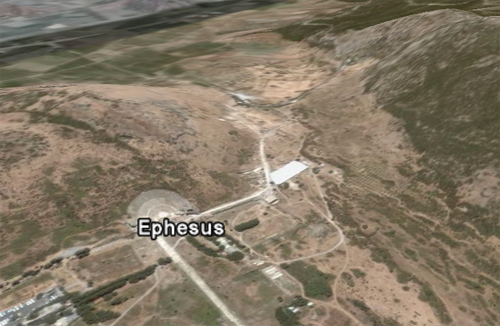
Google Earth View of Ephesus
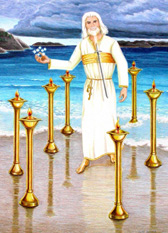
![]() How Jesus is described here? Holding the seven stars in his right hand, and walking among the seven golden lampstands.
How Jesus is described here? Holding the seven stars in his right hand, and walking among the seven golden lampstands. ![]() Have we seen this before? Yes, in the desciption of Jesus in the previous paragraph. We were told in Rev 1:20 that “the seven stars are the angels of the seven churches, and the seven lampstands are the seven churches.”
Have we seen this before? Yes, in the desciption of Jesus in the previous paragraph. We were told in Rev 1:20 that “the seven stars are the angels of the seven churches, and the seven lampstands are the seven churches.”
![]() Who are the seven stars? In Rev. 1:20 we were told they are “the angels of the seven churches”. By angels, we are to understand they are a “messenger from God, one who is sent” (Thayer). It is probable we could interpret this to symbolically represent apostles, pastors, or other church leaders.
Who are the seven stars? In Rev. 1:20 we were told they are “the angels of the seven churches”. By angels, we are to understand they are a “messenger from God, one who is sent” (Thayer). It is probable we could interpret this to symbolically represent apostles, pastors, or other church leaders.
![]() What is the significance of the stars being in his right hand? The right hand shows up many times in scripture, most typically describing the position of Jesus in relation to God the father, as in Luke 22:69 “Hereafter the Son of Man will sit on the right hand of the power of God.” It is the hand of power and favor. So, God puts an honor on his ministors, shows favor to them, and protects them.
What is the significance of the stars being in his right hand? The right hand shows up many times in scripture, most typically describing the position of Jesus in relation to God the father, as in Luke 22:69 “Hereafter the Son of Man will sit on the right hand of the power of God.” It is the hand of power and favor. So, God puts an honor on his ministors, shows favor to them, and protects them.
![]() Where is Jesus walking? Among the seven golden lampstands.
Where is Jesus walking? Among the seven golden lampstands. ![]() What do the lampstands represent? the seven churches (see Rev 1:20)
What do the lampstands represent? the seven churches (see Rev 1:20) ![]() What is the significance? Jesus walks amongst all of the churches. Present. Moving (not stagnating in one spot waiting for the churches to come to him). Jesus is walking with the church actively…right there to love.
What is the significance? Jesus walks amongst all of the churches. Present. Moving (not stagnating in one spot waiting for the churches to come to him). Jesus is walking with the church actively…right there to love.
Positives: Toil, Perseverance, Endurance, Intolerance of Evil, etc.
(2:2) ‘I know your works, your toil and your patient endurance, and how you cannot bear with those who are evil, but have tested those who call themselves apostles and are not, and found them to be false. (3) I know you are enduring patiently and bearing up for my name’s sake, and you have not grown weary. [ESV]
Positives: Toil, perseverance, endurance, testing
Deeds/Works: This is an overall descriptor common to all the churches, the other items listed here in the positives describe the works of this church.
- Labor/Toil – has a connotation of labor to the point of weariness
- Patient endurance – “the characteristic of a man who is not swerved from his deliberate purpose and his loyalty to faith and piety by even the greatest trials and sufferings” -Thayer
- Not tolerating evil ones – they do not put up with bad natured people who have a wrong or wicked way of thinking, feeling, or acting. These people they do not tolerate are described by Thayer’s Lexicon as troublesome, injurious, pernicious, destructive, or baneful.
- Test apostles – Earlier, in the letter of 1 Timothy, Timothy had been encouraged by Paul to remain in Ephesus to instruct others not to teach false/”other” doctrine (1Tim. 1:3). And here they are praised for their rooting out deceitful/false apostles.
 Negatives: Doing the Right Thing with Wrong Heart (Left First Love)
Negatives: Doing the Right Thing with Wrong Heart (Left First Love)
(2:4) ‘But I have this against you, that you have left your first love. (5) Remember therefore from where you have fallen; repent, and do the works you did at first. If not, I will come to you and remove your lampstand from its place, unless you repent. (6) Yet this you have: you hate the works of the Nicolaitans, which I also hate.
“But I have this against you” – Note that the “but” in this verse is not the commonly used greek word for but δέ (de), but rather is a much less common word for but, ἀλλά (alla) which would be differentiated as meaning more so “none the less” or “despite of all that”. AKA…this is a big but, not a minor one.
What did Jesus have against this church (Ephesus)? They had left their first love. First (protos) could mean either first in time/chronologically, or first in rank/significance. Love, here, is agape, or brotherly love. This is the same word for love as in 1 Cor. 13, where love is ranked of foremost importance out of all the spiritual gifts. Agape is also the kind of love used in Mark 12:28-31 (and repeated in the other gospels) to instruct that the most important commandment was to love God wholeheartedly, and second to love others as well.
“You shall love the LORD your God with all your heart, with all your soul, with all your mind, and with all your strength.’ This is the first commandment. And the second, like it, is this: ‘You shall love your neighbor as yourself.’ There is no other commandment greater than these.” (Mk. 12:30-31)
If I have the gift of prophecy…and if I have all faith….but do not have love, I am nothing. (1Co 13:2) Let all that you do be done in love. (1Co 16:14)
“the love of the saints to God, and Christ, and one another, which appeared at the beginning of this church state, when they were all of one heart and one soul, as generally at first conversion love is the warmest; and so it was at the first planting of Gospel churches, and therefore here called first love. Now this, though it was not lost, for the true grace of love can never be lost, yet it was left” (Gill)
“Eph 1:15 For this reason I too, having heard of the faith in the Lord Jesus which exists among you and your love for all the saints…”
What was Jesus’ solution, therefore (v. 5)? They should remember where they’d fallen from, repent, and do their first works again. “They were to continue their service not simply because it was right but because they loved Christ.” -BKC
What threat is made if they don’t follow through and do as suggested? (v. 5) Their lampstand will be removed. “Work for God must be motivated by love for God, or it will not last.” -Life Application Study Bible
Who were the Nicolatians? (v. 6) “There has been much speculation concerning the identity of the Nicolaitans, but the Scriptures do not specify who they were. They apparently were a sect wrong in practice and in doctrine” (BKC). The Nicolatians are mentioned again in 2:15 in the description of the church of Pergamum.
Toil, perseverance, endurance, testing, cannot replace a sincere love for Jesus.
| Application: Are you busy or in love? |
| You can’t fool the Lord. Activity does not equate to love. You can be busy but not love.
Loving Jesus = foundation everything else is built off. Therefore remember where you have fallen from. Love is the high mark (vs. a life of “success”). A genuine (sincere) love for the Lord is the highest goal. You should be more in love with Jesus today than you were a year ago. It shouldn’t be diminishing. Have you fallen? (Jesus’s definition of falling does not mean sin, but doing the right things with the wrong heart). Can you remember a time when you loved Him more? If you can move on to #2, repent and pursue your first love: stop and hang out with Jesus. Are you doing the things that promote love? Start pursuing love and not just accepting that you’ve fallen out of that. There is no such thing as “falling” out of love, you leave it; IF you’re not feeling it, you left it. We have a natural predisposition to sin. John’s solution is not to disengage from works. He says to keep doing the deeds, but out of love (adoration), not obligation. |
Another contrast (v6): you don’t love what I love but at least you hate what I hate. The application here = repent (realize who you’re being cold-hearted to…)
Most of us don’t actively TRY to leave love, we get distracted and it’s a slow process, an orientation toward something else (wheat among the tares, competing desires).
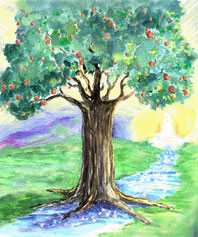 Overcomers: Eat of the Tree of Life
Overcomers: Eat of the Tree of Life
(7) He who has an ear, let him hear what the Spirit says to the churches. To the one who conquers I will grant to eat of the tree of life, which is in the paradise of God.’
Deeds don’t compete with love. Deeds demonstrate the reality of your love. You can change but it requires overcoming, takes effort, there’s an obstacle in your way. Jesus promises the over-comer (v 7) the tree of life (eternal life) in the paradise of God. Implication on salvation: eternal life is about loving God. This is a reward because that’s what Jesus wants you to do for eternity. Doesn’t want half-heartedness, empty works, not looking for “success”, he’s looking for you to be loving.
Jesus described himself to the church of Ephesus: seven stars…seven gold lamp-stands = churches… Jesus is walking with the church actively…right there to love. ![]() Do everything you do out of love to him. Start doing things/ministry as a message of love.
Do everything you do out of love to him. Start doing things/ministry as a message of love.
What is the “tree of life”? The tree of life first appeared in the bible in Genesis, in the Garden of Eden, mentioned in Genesis 2:9 (and Gen. 3:22-24), and man was prohibited from eating of this tree in Gen 3:22-24. However, overcomers will one day be permitted to eat of this tree. “The tree of life originally stood in the Garden of Eden (Gen. 2:9). By partaking of its fruit, man had eternal life. But through the Fall, man lost access to the tree (Gen. 3:22-24).” (TOJC) “To eat of the tree of life expresses participation in the life eternal. The figure of the tree of life appears in all mythologies from India to Scandinavia.” (VWS) “The tree of life is a common motif for righteousness and wisdom in Scripture (Psa. 1:3; Pro. 3:18; Pr.o 11:30; Pro. 13:12; Pro. 15:4) for it is by righteousness and wisdom that life is lived to the full. For this reason, the Jews referred to the Word of God as the “tree of life”. (TOJC)
“the tree of life means being equipped with a “special wisdom and knowledge” for the future kingdom. Proverbs 3:18; 11:30. This tree of Life first appears in Genesis where it says man was created to rule and reign with the King of Kings over all the earth. (Genesis 1:26-28) Then, it disappears on the earth for 6000 years because man was not in a position to rule and reign with Christ. But, here in Revelation, it shows up again in the Millennial Kingdom as man will, once again, be in a position to co-reign (Genesis 1:26-28). So, the “tree of life” has something to do with our future inheritance in the Millennial Kingdom. It has to do with special wisdom and knowledge in order to co-reign with Christ. (Proverbs 3:13-18)” -Nancy Missler
What is the “paradise of God”? “The location of paradise after the victory of Jesus on the cross moved to heaven, for Paul was ‘caught up into Paradise’ where he heard inexpressible words (2Co. 12:4). Essentially, the term describes the abode of righteous men upon death:” (TOJC)“Heaven, represented as paradise. To be permitted to eat of that tree, that is, of the fruit of that tree, is but another expression implying the promise of eternal life, and of being happy forever.” (Barnes) “The abode of God and the home of the redeemed with Christ” (RWP).
“He is thus restored to what he might have been if he had not transgressed by eating of the fruit of the tree of the knowledge of good and evil; and in the Paradise Regained, the blessings of the Paradise Lost will be more than recovered – for man may now live forever in a far higher and more blessed state than his would have been in Eden.” (Barnes)
Ephesus Summary
You can’t compensate for distance from Jesus with more ministry.
Smyrna (Persecuted Church) [Rev. 2:8-11]
Smyrna was a rival ciy to Ephasus, a naturally beautiful and rich city. It was well situated for trade, with a well-protected land-locked harbor at the city’s heart and roads crossing Lydia and Phrygia and on to the far east. Symrna had been formed as greek colony as far back as 1000BC. In 600BC the Lydians broke in and destroyed the city. For over 400 years, all that remained were small villages, until it was rebuilt as a whole planned city with handsome wide streets. There was even a famous street paved with gold running between temples to the “Gods” of Zeus and Cybele. It was a city with flourishing culture and compassion for others.
The name Smyrna comes from myrrh, a spice usually associated with burial and death.
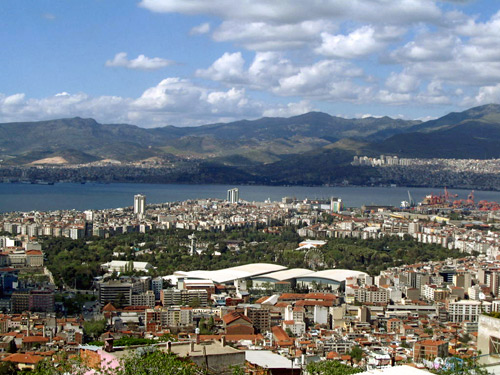
Izmir (Smyrna) is Turkey’s Main Port for Exports
Used by Permission of David Phillips
| v. 8: Jesus is described as: |
|
| v. 9: Jesus knows: |
|
| v 10: Instructed to: |
|
| v. 11: Overcomers get: |
|
This church has a lot of deviation from the standard structure.
(2:8) “And to the angel of the church in Smyrna write: The first and the last, who was dead, and has come to life, says this:
![]() How is Jesus described to Smyrna? (2:8)
How is Jesus described to Smyrna? (2:8)
 The first and the last –
The first and the last –  These descriptors get to Jesus’s eternal character. Eternal, encompassing all time
These descriptors get to Jesus’s eternal character. Eternal, encompassing all time  Does this reflect your view of Jesus? Do you see him as eternal as he is? This reflects a promise to Christians, but to pagans of Smyrna it would have been a warning.
Does this reflect your view of Jesus? Do you see him as eternal as he is? This reflects a promise to Christians, but to pagans of Smyrna it would have been a warning. who was dead and has come to life –
who was dead and has come to life –  Death is not the end, it is only temporary.
Death is not the end, it is only temporary.  Do not fear death. “The tenses of the verb are of the first importance. The Greek for “was” is genomenos (compare <G1510>), which means became. It describes what we might call a passing phase. Christ became dead; it was episode through which he passed. In the Greek the verb which the King James Version translates “is alive” is not a present tense but an aorist, which describes one action completed in the past. The right translation is “came to life again” (Barclay). This title as a savior, victorious over death, helps emphasize his message about being faithful unto death and not fearing death.
Do not fear death. “The tenses of the verb are of the first importance. The Greek for “was” is genomenos (compare <G1510>), which means became. It describes what we might call a passing phase. Christ became dead; it was episode through which he passed. In the Greek the verb which the King James Version translates “is alive” is not a present tense but an aorist, which describes one action completed in the past. The right translation is “came to life again” (Barclay). This title as a savior, victorious over death, helps emphasize his message about being faithful unto death and not fearing death.
Positives: Tribulation. Negatives: None
(2:9) 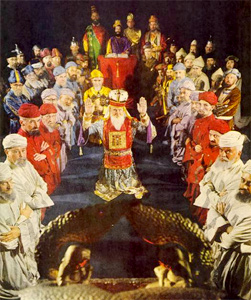 ‘I know your tribulation and your poverty (but you are rich), and the blasphemy by those who say they are Jews and are not, but are a synagogue of Satan.
‘I know your tribulation and your poverty (but you are rich), and the blasphemy by those who say they are Jews and are not, but are a synagogue of Satan.
![]() What does Jesus know about Smyrna? (2:9)
What does Jesus know about Smyrna? (2:9)
 their tribulation
their tribulation their poverty (but they are rich)
their poverty (but they are rich)
 God’s perspective is often very different from our own.
God’s perspective is often very different from our own. Are there areas where your perspective isn’t lined up with God’s?
Are there areas where your perspective isn’t lined up with God’s?
 the blasphemy of those who say they are Jews but aren’t (really are a synagogue of Satan)
the blasphemy of those who say they are Jews but aren’t (really are a synagogue of Satan)
![]() Two instances here where perception doesn’t match reality: Those who think they are poor are really rich, and some of those who think they are Jews are really of the Synagogue of Satan. You can look “on top of things” but really be a meaty place for the devil.
Two instances here where perception doesn’t match reality: Those who think they are poor are really rich, and some of those who think they are Jews are really of the Synagogue of Satan. You can look “on top of things” but really be a meaty place for the devil.
Their poverty – “In Greek there are two words for poverty. It has been put this way–penia (<G3993>) describes the state of the man who has nothing superfluous; ptocheia (<G4432>) describes the state of the man who has nothing at all [destitute]. Here, they are described as the latter.
How is Smyrna poor? Although Smyrna was historically a propserous city, the Christians there were apparently poor. And not just poor, destitute, or in abject poverty. Early Christians were often robbed, joyfully accepted plundering (Heb 10:34), or fired from their jobs, persecuted because of the gospel. Likely this was an economic poverty.
How is Smyrna rich? Not in a material sense, but rich in the things of God, spiritual riches. Jesus considered them rich. “Our estimation of ourselves is far less important than God’s estimation of us.” (Guzik)
“Amidst of this kind of affliction, it is easy to think God has forgotten. But Jesus knows.” (Guzik)
This church, that although poor, is really rich, is in contrast to Laodicea, that thought itself rich but was really poor. Of these two, it is clearly better to be a rich poor church than a poor rich church.
![]() Structure deviation: There is no contrast here, there is nothing negative Jesus has to say about this church.
Structure deviation: There is no contrast here, there is nothing negative Jesus has to say about this church. ![]() No rebuke or correction is needed in their circumstances, just encouragement.
No rebuke or correction is needed in their circumstances, just encouragement.
‘Do not fear what you are about to suffer. Behold, the devil is about to cast some of you into prison, so that you will be tested, and you will have tribulation for ten days Be faithful until death, and I will give you the crown of life. (Rev 2:10)
![]() What is the church of Smyrna to do? (2:10)
What is the church of Smyrna to do? (2:10)
-
 not fear what they are about to endure
not fear what they are about to endure
- “Do not fear: Literally, this is better translated ‘stop being afraid.'” (Guzik)
 Our attitude in testing should not be one of fear
Our attitude in testing should not be one of fear
 endure the devil casting them into prison for testing
endure the devil casting them into prison for testing
- The nature of the testing they were about to face was from the devil. But limited in time by God.
- Prison in those days had no sense of rehabilitation or punishement, it was, rather, a severe form of persecution. In those days, prison was where you went while you awaited trial and execution.
 Testing = so that you will be tried/proven
Testing = so that you will be tried/proven You have to put things under stress/strain to test them, you are not proven by the good/easy times.
You have to put things under stress/strain to test them, you are not proven by the good/easy times.- Analogy: engineering testing
- You do everything you can think of that might cause the product to fail, and see whether it can successfully withstand the abuse. If not there’s a defect that needs fixing. If it succeeds its production ready.
 Our thinking is to run from testing, but really we grow from testing.
Our thinking is to run from testing, but really we grow from testing.
 endure tribulation for ten days
endure tribulation for ten days
- Tribulation, as mentioned here, does not mean ordinary trials, but th sort of tribulation and troubles that would not have come upon them if they were not persons of faith.
- “God uses suffering to purify (1Pe. 1:6-7), to make us like Jesus (Rom. 8:17), and to makes us truly witnesses of Him.” (Guzik)
 This is a short and fixed period of time. It has a distinct end, it’s not permanent. The testing will end. (some people debate about whether the 10 days is meant to be taken literally or figuratively, but such is probably not constructive in determining what this passage is trying to say)
This is a short and fixed period of time. It has a distinct end, it’s not permanent. The testing will end. (some people debate about whether the 10 days is meant to be taken literally or figuratively, but such is probably not constructive in determining what this passage is trying to say) Be faithful for the whole short period of testing. The end is not to make your life difficult.
Be faithful for the whole short period of testing. The end is not to make your life difficult.
 be faithful unto death (
be faithful unto death (  given crown of life)
given crown of life)
 You could die. This church is one that is willing to die for Him (and one of only two that Jesus has nothing against)
You could die. This church is one that is willing to die for Him (and one of only two that Jesus has nothing against) Are you afraid of trial? Of things going wrong or bad? You getting hurt? Maybe you need an attitude adjustment.
Are you afraid of trial? Of things going wrong or bad? You getting hurt? Maybe you need an attitude adjustment.
Given a crown of life – “In Greek there are two words for crown, diadema (<G0>), which means the royal crown, and stephanos (<G4735>), which has usually something to do with joy and victory. It is not the royal crown which is being offered to the Christian; it is the crown of joy and victory.” (Barclay) Like an olympic crown, or that of a faithful magistrate, apparel for a banquet, or those used when approaching a temple.
Overcomers: Will Not Be Hurt by Second Death
‘He who has an ear, let him hear what the Spirit says to the churches. He who overcomes will not be hurt by the second death.’ (Rev 2:11)
![]() What will happen to those that overcome? (2:10)
What will happen to those that overcome? (2:10)
 will not be hurt by second death
will not be hurt by second death
- Jesus described himself as the one who resurrects.
 Death is not something we should fear (Jesus has been there and done that), its only temporary, and not eternal for those who love the Lord.
Death is not something we should fear (Jesus has been there and done that), its only temporary, and not eternal for those who love the Lord.  First death = the physical body, Second death = eternal separation from God. Both are separations. The first = momentary, in the context of time, there is an end to the pain associated with it. The second = in the context of eternity, and the pain associated with it = eternal.
First death = the physical body, Second death = eternal separation from God. Both are separations. The first = momentary, in the context of time, there is an end to the pain associated with it. The second = in the context of eternity, and the pain associated with it = eternal. The second death won’t hurt, but the first might.
The second death won’t hurt, but the first might. Pain now means you won’t suffer the second death.
Pain now means you won’t suffer the second death.  It is worth suffering, pain, and difficulty in this death to avoid the second death.
It is worth suffering, pain, and difficulty in this death to avoid the second death.
- Jesus described himself as the one who resurrects.
| First Death | Second Death |
| The Physical Body | Eternal Seperation from God |
| Momentary | Eternal |
![]() What is overcame? Fear of suffering in this life. Guarantee? Won’t be touched by the second death.
What is overcame? Fear of suffering in this life. Guarantee? Won’t be touched by the second death.
Who is this promise (not being hurt by the second death) for? Those who have overcome. Overcome what? Persecution.
What is the second death? Sometimes it is referred to as hell or the lake of fire (Rev. 20:14 and 21:8). Rev. 20:14 clarifies the lake of fire is the second death.
| Application: Bring Glory to God, Don’t Avoid Suffering |
Implication: This life is about bringing glory to God, not avoiding suffering. Don’t be imprisoned by fear.
|
Pergamum (Compromising Church) [Rev. 2:12-17]
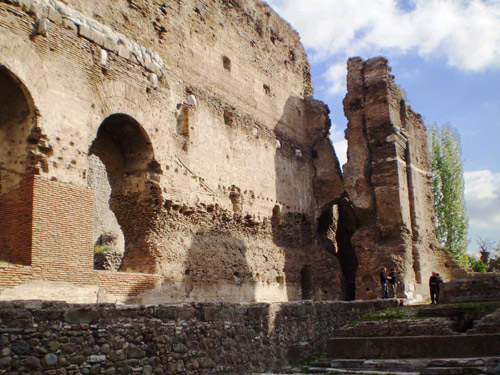
Pergamum’s Red Egyptian Temple (David Phillips)
Pergamum or Pergamos (near the modern city of Bergama) was an illustrious and famous city in the Province of Asia, about 20 miles from the sea. Although it was not on any of the great roads as Ephesus and Smyrna were, it had an impressive location. It was at the top of a tall conical hill, from which the Mediterranean, 15 miles away, could be seen. At the time of John’s letter Pergamum had already been the capital city for almost 400 years. Pergamum had a famous library with over 200,000 parchment rolls, second only to the library of Alexandria. In fact, the word “parchment” is derived from Pergamum, as Pergamum was where parchment was invented, in response to a retaliatory export embargo against egyptian papyrus. (Barclay)
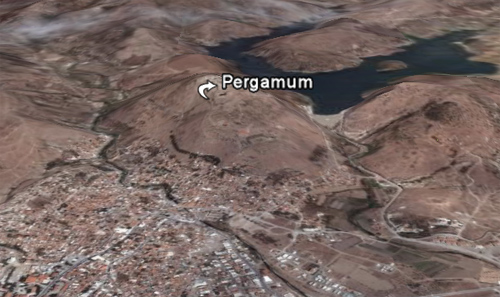
“And to the angel of the church in Pergamum write: The One who has the sharp two-edged sword says this: (Rev 2:12)
Jesus: a sharp two-edged sword (that is coming out of his mouth) -> his word sharp like a two edged sword, divides what is right from what is wrong.
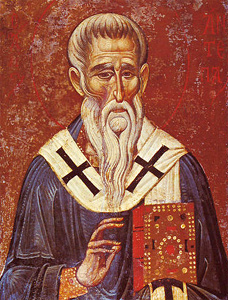 Positives: Hold Fast to Jesus Name, Don’t Deny Faith
Positives: Hold Fast to Jesus Name, Don’t Deny Faith
‘I know where you dwell, where Satan’s throne is; and you hold fast My name, and did not deny My faith even in the days of Antipas, My witness, My faithful one, who was killed among you, where Satan dwells. (Rev 2:13)
I know: where you dwell–the hood, where Satan’s throne is (the Capital of Satan in modern vernacular). He’s not God’s counterpart. He’s not omnipresent. So he has a base of operations (at this time in Pergamum).
Their surroundings are hostile, probably the most hostile possible. Yet they’ve held fast to God in that environment. The price of that? Martyrdom (like Antipas). This means they are committed…to death (which is a very real potential for them).
Who is Antipas? “One specific man among the Christians of Pergamos received a precious title (faithful martyr). This same title is held by Jesus also (Rev. 1:5). Antipas was a man who followed Jesus, who was like Jesus.Antipas is one of the great anonymous heroes of the Bible. History tells us nothing about him except for here. … Antipas means “Against All.” “(Guzik)
Negatives: Teaching Doctrine of Idols, Prosperity, & Pleasure
‘But I have a few things against you, because you have there some who hold the teaching of Balaam, who kept teaching Balak to put a stumbling block before the sons of Israel, to eat things sacrificed to idols and to commit acts of immorality. (Rev 2:14)
Note that we have a FEW things against them, which is more than before in the other letters.
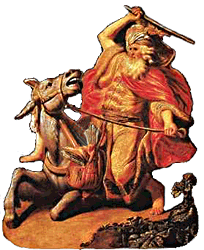 Who were Balaam and Balak? Balak was the King of Moab (see Numbers 22-25) who tried to hire (bribe?) an occult fortune-teller (“diviner”) Balaam to curse Israel (but God turned it into a blessing). Failing this, Balak’s people invited the Israelites to engage in sexual immorality and worship their idols (Num 25:1-2, 31:16).
Who were Balaam and Balak? Balak was the King of Moab (see Numbers 22-25) who tried to hire (bribe?) an occult fortune-teller (“diviner”) Balaam to curse Israel (but God turned it into a blessing). Failing this, Balak’s people invited the Israelites to engage in sexual immorality and worship their idols (Num 25:1-2, 31:16).
What is Balaam’s “teaching”? Balaam’s teaching (“counsel”) was teaching the Israelites to sin (“commit trespass”) against the Lord (Num 31:16).
Balaam teaches:
- to stumble others, how to cause God’s people to stumble in their relationship with God.
- Sexual immorality
- Eating things sacrificed to idols. Taking part of the worship of that idol. feasting on Goodness of the Lord when sacrificed to God? Here feasting of what this false God has to offer.
Major idols in their day:
- Baal = the storm God, God of weather, looked to to bring rain. Significant: crops (bring money) and prosperity. Worshipped for supposed prosperity. We still (as a society) worship money. 401k anyone?
- Molech = “God” whose idol was a big bronze statue. Barbaric horrific child sacrifice. seen to be as the protector from bad. Give your children over to everything bad so he’d save you. the god of SECURITY. Application: “farming out” children to daycare for your own security/personal benefit at the expense of your children? Divorce?
- Ashtoreth = God of fertility. Ashtoreth pole (phallic symbol) God of sexual pleasure.
We still have these idols in our society, just not by name.
|
Baal
|
Molech
|
Ashtoreth
|
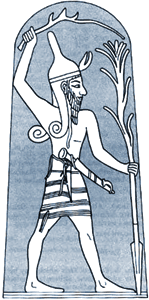 |
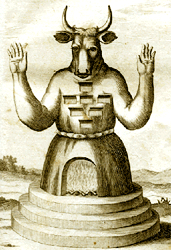 |
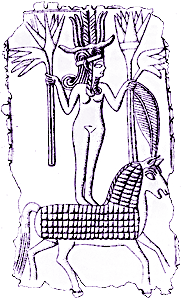 |
Implication: in our day an age and idol = anything you look to be the power that brings meaning/power/significance to your life.
**Teaching others to do these things** = problem. This negative is as significant as their positive (holding fast to God unto death).
Teaching others to stumble in their walk with God is a significant sin. “but whoever causes one of these little ones who believe in Me to stumble, it would be better for him to have a heavy millstone hung around his neck, and to be drowned in the depth of the sea.” (Mt 18:6)
‘So you also have some who in the same way hold the teaching of the Nicolaitans. (Rev 2:15)
Others were holding to teachings of Nicolaitans – remember that in 2:6 God hated their teaching, so here it is saying that it is bad that people are holding to a teaching that God hates.
they HOLD TO (unwilling to let go). Are you justifying your sin saying its “not that bad”?
‘Therefore repent; or else I am coming to you quickly, and I will make war against them with the sword of My mouth. (Rev 2:16)
| Application: Teaching Like the Nicolaitans? |
| Churches today almost always have some element of doctrine in them that can be stumbling blocks. They will allow or even suggest things that might cause you to stumble in your walk with God. Teaching others to stumble in their walk with God is a serious problem. Is your church teaching doctrine that isn’t biblical? Suggesting things in life that will cause you to stumble?
Things the Church Today Isn’t Teaching:
Preach through your behavior: Sometimes the most effective preaching is the way you live your life. |
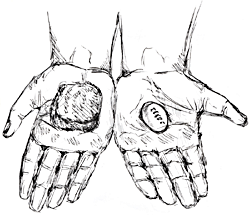 Overcomers: Hidden Manna
Overcomers: Hidden Manna
‘He who has an ear, let him hear what the Spirit says to the churches To him who overcomes, to him I will give some of the hidden manna, and I will give him a white stone, and a new name written on the stone which no one knows but he who receives it.’ (Rev 2:17)
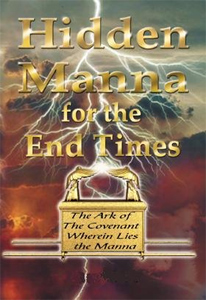 Reward for those who overcome this temptation:
Reward for those who overcome this temptation:
- Hidden manna (= sustenance from heaven), a secret stash of the Lord for those who overcome the temptation to compromise their purity. The pure at heart shall see God (mt5). There is hidden manna there for you. If you’re not seeing things (God) you should look at your purity. God doesn’t throw pearls before swine.
- White stone – white = purity, stone = solid. -> a rock solid purity. Not a wimpy “milk-toast” purity. Not on a black stone. Some people are holding onto a stumbling block rather than new rock/identity…You are not coming to the Lord out of guilt and shame anymore.
- A new name – defines you, your identity. You will get a fresh sense of identity written on a rock solid purity (not your filthy past), a special thing between you and the Lord
“In the ancient world, the use of a white stone had many associations. A white stone could be a ticket to a banquet, a sign of friendship, evidence of having been counted, or as a sign of acquittal in a court of law.” (Guzik)
Thyatira (Compromising/Immoral Church) [Rev. 2:18-29]
Background on Thyatira
Thyatira was apparently the smallest and “least important” of the cities addressed in these two chapters, laying in an open valley on the road connecting Pergamum and Sardis. It was significant neither militarily or religiously. Although it had an armed garrison to “protect” Pergamum (a more prominant city: the province’s capitol), it’s open valley was not strategically situated to carry out any sort of prolonged defense. “In history, we have no record that the Christians of Thyatira suffered any significant political or religious persecution.” (Guzik). It was, however, an important center of business and trade, boasting an extraordinary numbers of active trade guilds, each with their own patron deity (Greek or Roman gods). Lydia, the seller of purple cloth (Acts 16:14-15), who was “faithful to the Lord” was also from Thyatira. Notable trades in Thyatira included the dyeing industry and manufacture/trade of woolen goods.
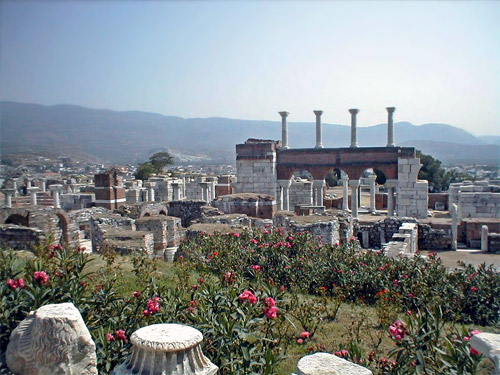
Thyatira (Cornerstone Arts)
“And to the angel of the church in Thyatira write: The Son of God, who has eyes like a flame of fire, and His feet are like burnished bronze, says this: (Rev 2:18)
How does Jesus describe himself? Son of God, eyes like a flame of fire, feet like burnished bronze in a furnace.
Son of God – This title emphasizes his deity, how he has the nature of God. .Previously, in Revelation 1:13-15, in the parallel description of Jesus, his title was given as Son of Man, emphasizing his more human nature. Emphasis of hie deity would seem important when it comes to his righteous indignation of their sins.
How were his eyes described? Like a flame of fire. Why? “The reference to His eyes being “like blazing fire” and the brilliant reflections of His feet emphasize the indignation and righteous judgment of Christ.” (BKC) ” The eyes speak of piercing vision” (BBC) “His eyes look with a penetrating judgment.” (Guzik)
How are his feet described? Like (fine) burnished bronze (brass). “It seems to have been an alloy of a number of metals characterized by brilliance when polished.” (BKC) “the brass feet speak of [the] threatened judgment” (BBC) “Jesus chose this description of Himself…to emphasize His purity, because brass is pure, and highly refined in the fire. It also emphasizes His steadfastness, because brass was the strongest known metal in the ancient world, and feet like fine brass would be strong and unmovable.” (Guzik)
Positives: Increasing: Love, Faith, Service, Perseverance
‘I know your deeds [works], and your love and faith and service and perseverance, and that your deeds of late are greater than at first. (Rev 2:19)
I konw your works – Even in the small insignificant town of Thyatira, their works were not hidden from Jesus. Like all of the other cities, Jesus knows their works.
I know… your deeds, love, faith, service, persecution. DEEDS are getting better (improving). It is a compliment to say they are growing in love, service, faith, and patience.
These qualities come in pairs. “Service is the outcome of love and patient endurance the product of loyalty [faith].” (DSB)
“In many ways, the church at Thyatira was a model church. They had four great essential qualities. They had love, both for the Lord and for one another. They knew service, and had faith and patience worth mentioning.” (Guzik)
Negatives:
 Tolerate Jezebel (Self-Promotion, Immorality)
Tolerate Jezebel (Self-Promotion, Immorality)
Nevertheless I have this against you, that you tolerate the woman Jezebel, who calls herself a prophetess, and she teaches and leads My bond-servants astray so that they commit acts of immorality and eat things sacrificed to idols. (Rev 2:20)
“Nevertheless: Despite all the good Jesus sees in the church at Thyatira, there are significant problems. The problems are big enough for Jesus to say nevertheless, which means ‘despite all the good, I have a few things against you.’ (Guzik)
but: TOLERATE Jezebel. Jesus had it against them that they are tolerant (to not confront it, allow to happen, sweep under the rug. Jezebel calls herself a prophetess (she’s not) self proclaimed, putting herself in a position. One thing seen negative in her is self-promotion, putting herself in a position the church hasn’t confirmed. There is a process in the church for recognizing people in authority (she’s not following that). She also teaches and leads bond-servants astray into immorality and eating sacrifices (Same mindset as Balaam).
Who was Jezebel? This may not have been her literal name, but a title that follows after the pattern of Jezebel in the Old Testament, one of the most evil characters of the Old Testament (Walvoord), who attempted to combine the worship of Isreal with the worship of the idol Baal. The name itself has a powerful association, just as if we called someone “Judas” or “Hitler”.
How is Jezebel described here? As a self-proclaimed prophetess. Genuine Prophetesses did exist in the bible in both the old and new testaments (Miriam, Deborah, Anna, Daughters of Philip, etc), but she apparently wasn’t one of them. However, it does appear that she may have been received as a prophetess by others, given an undeserved clout as a “spokeswoman” for God (but she wasn’t). Mat. 24:11 and elsewhere talk about how many false prophets will rise up and deceive many.
What was the problem with Jezebel? (1) leading committed believers to commit acts of immorality, and (2) leading them to eat things sacrificed to idols.
Acts of immorality – it is unclear from the terminology used whether this is meant to be taken literally in the phyical sense (fornication, engaging the body in sin, etc), or whether this is meant to be in the metaphorical sense, spiritual infidelity (“playing the harlot after strange Gods…” Ex 34:15-16), perhaps the metaphor exists on multiple levels.
Who was Jezebel leading into acts of immorality? bond-servants, those who had commited their lives to Christ, those who belong to Christ. (According ot Mark 9:42, leading those who believe in Him to stumble was a grievous offense)
“Abstention from guild membership was equivalent to commercial suicide. Here is where Jezebel came in. She urged upon the Christians that there was no need to cut themselves off from society or abstain from the guilds. When she did so, she was not proceeding on grounds of principle but was simply trying to protect her business interests. Jezebel is to be counted amongst those to whom the claims of commercial success speak more loudly than the claims of Christ.” (DSB)
“No merchant or trader could hope to prosper or make money unless he was a member of his trade guild.” (Barclay)
Thyatira was a great commercial center, with a great number of local trade guilds, associations for those engaged in certain trades (eg: making of garments, dying, pottery, wool-workers, etc), for both pleasure and profit. “Here, we think, was the problem of the Church in Thyatira. To refuse to join one of [the many local trade] guilds would be much the same as to refuse to join a trade union today. It would mean to give up all prospect of commercial existence. [..]They held common meals [often] held in a temple and even if not, they would begin and end with a formal sacrifice to the gods, and the meat eaten would be meat which had already been offered to idols. Further, it often happened that these communal meals were occasions of drunken revelry and slack morality. […] There was a strong movement, led by the woman addressed as Jezebel, which pled for compromise with the world’s standards in the interests of business and commercial prosperity, maintaining, no doubt, that the Holy Spirit could preserve them from any harm. The answer of the Risen Christ is unequivocal. With such things the Christian must have nothing to do. ” (DSB)
Who tolerates Jezebel? The church of Thyatira. On the outside, a model church, showing love, service, faith, and patience. On the inside, corrupton and sin, they tolerated or allowed Jezebel in their church.
Illness and Tribulation and Disease to the Unrepentant
‘I gave her time to repent, and she does not want to repent of her immorality. (Rev 2:21)
God gave her time to repent…He is confronting her with her error (conviction). But she didn’t WANT TO repent. It’s not about being able, it’s about not wanting to change, wanting whatever more than God.
Conviction alone does not always produce repentance. You can realize something is wrong without any desire to change.
“Jesus’ greatest accusation is that this ‘Jezebel’ did not repent. She apparently rejects the work of the Holy Spirit in her heart, calling her to repentance…In these words we see both the mercy and judgment of our Lord. Time to repent shows mercy. God gives us time to repent, we should deal with others the same way. And she did not repent speaks to the judgment of God. God gives time to repent, but it is not an unlimited time. There is a time when God says, My Spirit shall not strive with man forever (Gen. 6:3). This means that when God gives us time to repent, we must take advantage of that time.” (Guzik)
 ‘Behold, I will throw her on a bed of sickness, and those who commit adultery with her into great tribulation, unless they repent of her deeds. (Rev 2:22)
‘Behold, I will throw her on a bed of sickness, and those who commit adultery with her into great tribulation, unless they repent of her deeds. (Rev 2:22)
God’s going to bring about consequences (a physical ailment) to her and those sinning with her to get her attention. (Lord is there anything I need to repent of?)
It’s amazing how much you pray when you are that sick.
He will put them into GREAT tribulation. Sickness = just a little warning shot.
When we are unrepentant, God may bring us into sickness in order to bring about repentance.
Here we see the consequences brought up before the instructions on how to avoid such consequence.
bed of sickness or sickbed – this has a little bit of a play on words, as the greek word used for bed here also happens to be the word for banqueting couch, what would have been sat on for the forbidden feasts sacrificed to idols, in addition to the diea of laying in bed sick, afflicted with illness.
What is the purpose of being cast onto the sickbed? To draw those engaging in immorality to repent of their deeds.
‘And I will kill her children with pestilence, and all the churches will know that I am He who searches the minds and hearts; and I will give to each one of you according to your deeds. (Rev 2:23)
next: kill her children with pestilence.
“Will give to each accoring to his deeds” –
Let the churches know: God searching the mind and heart and give to each according to their deeds. God is not tolerant. God will be gracious to those who repent, but intolerant of a lifestyle of continual sin. Sin is more destructive to your life than God’s dealing with you. If you have areas of compromise in your life, that’s a big deal to God. He isn’t tolerant of those who “play games with God”. He will treat you to what your deeds deserve. He is writing to churches (believers) here.
God is searching hearts and minds; you may have the rest of us fooled but God knows what’s really going on. Search your heart, prayer, meditation. God already knows the truth. Stop pretending there is not an issue. Don’t tolerate self-appointed leaders who are problem damaging the church. Confront the damaging.
“DEEDS show what you BELIEVE and whether one has truly received the truth so as to be saved.” -Kay Arthur
‘But I say to you, the rest who are in Thyatira, who do not hold this teaching, who have not known the deep things of Satan, as they call them–I place no other burden on you. (Rev 2:24) ‘Nevertheless what you have, hold fast until I come. (Rev 2:25)
Contrast: everybody else is cool, not laying any other burden on them; they already have deeds, love, faith, service. Sometimes the problem isn’t what you’re doing but what you’re not doing. It can be easy to justify shortcomings when you shine in other areas.
God doesn’t tolerate compromise even if you are shining in every other area.
Here we see Jezebel’s teaching associated with knowing the “depths” or deep things of Satan.
Overcomers: Authority over the Nations
(2:26) ‘He who overcomes, and he who keeps My deeds until the end, TO HIM I WILL GIVE AUTHORITY OVER THE NATIONS; (27) AND HE SHALL RULE THEM WITH A ROD OF IRON, AS THE VESSELS OF THE POTTER ARE BROKEN TO PIECES, as I also have received authority from My Father; (28) and I will give him the morning star. (29) ‘He who has an ear, let him hear what the Spirit says to the churches.’
What they are encouraged to overcome: allowing obvious problems to continue. “It’s not how you start but how you finish!” (Kay Arthur).
To those who overcome: authority over the nations, rule with them: powerful. strong.
Rod of Iron = inflexible, set standard.
You have to have set standards for your life. The fact that it is a buzzword in our culture should be a red flag to you.
What is the morning star? Later on, in Rev 22:16, Jesus calls himself “the bright and morning star”, so this is clearly a reference to Christ giving overcomers himself. Other, more debatable, interpretations include: (1) It is the promise of the first resurrection, like the morning star rising after night. (2) The conquest of Lucifer (light-bringer), implying complete power over satan and sin. (3) It is a reference to Den 12:3 and how the wise shall shine like stars, referring to the glory of helping others walk in the paths of righteousness. “Jesus offers them a reward greater than the kingdom. He offers them the reward of Himself” (Guzik)
Here: not that they engage (in sin or compromise) but that they tolerate it.
- Application = inward. what are you tolerating in your own life?
- Application = outward. Do you present yourself modestly to the world?
- You won’t rule with Christ if you don’t have that strict standard for your own life.
” The necessary conclusion seems to be this. On the surface the Church at Thyatira was strong and flourishing. If a stranger went into it, he would be impressed with its abounding energy and its generous liberality and its apparent steadfastness. For all that, there was something essential missing. Here is a warning. A church which is crowded with people and which is a hive of energy is not necessarily a real Church. It is possible for a Church to be crowded because its people come to be entertained instead of instructed, and to be soothed instead of confronted with the fact of sin and the offer of salvation; it maybe a highly successful Christian club rather than a real Christian congregation.” (DSB)
“When we began to study the letter to Thyatira we saw that anyone coming into that Church for the first time would have believed it to be surging with life and fruitful in every good work. No doubt those who prospered in business because of their compromise with the world were lavish in their liberality. No doubt those who attended the trade guilds gave generously to charitable funds. They looked like real Christians. No doubt Jezebel seemed to many a fine character. She must have had a command of language and a fine presence to be regarded as a prophetess. The point here is that the Risen Christ can see beyond the outward disguise; he will know whether or not her repentance is real.” (DSB)
Sardis (Dead Church) [Rev. 3:1-6]
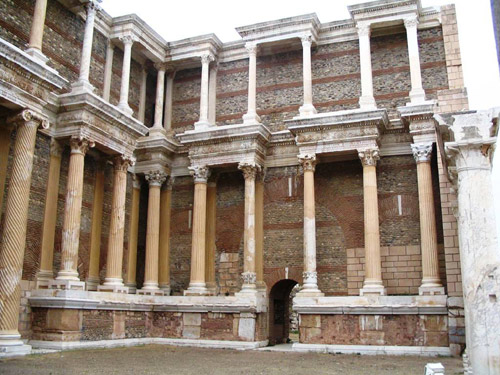
Gymnasium in Sardis (David Phillips)
Inductive Study:
Main Structure: 3 causations, implied causation v 1-2
Main Idea: Good reputation but no reality.
Sardis means “remnant”. It was a wealthy city that seemed invincible, built on 1000 foot bluffs. But history repeated itself multiple times with events like in 549 BC when it was conquered by Babylon, because they felt so invincible they didn’t even bother to have guards on duty.
“And to the angel of the church in Sardis write, ‘These things says He who has the seven Spirits of God and the seven stars:’” (3:1a)
angel = messenger (in Greek)
seven stars = seven angels = seven messengers
Why mention the seven spirits? Was this church perhaps wary of the ministry of the Spirit? Likely so since they were spiritually dead.
Positives: A Good Name. Negatives: Dead.
“I know your works, that you have a name that you are alive, x but you are dead.” (3:1b)
Dead = lifeless, separation between soul and body, spiritual death, a disconnect.
Name = who you are known as, a reputation (note: we get our English word Denomination from this greek word)
![]()
![]() What does it mean to be spiritually alive? Spiritually dead?
What does it mean to be spiritually alive? Spiritually dead? ![]()
![]()
Not a whole lot of positives here. This church has a reputation for being alive, once upon a time it was. Reputation is from the past, not the present.
| Application: Reputation vs. Reality |
| A reputation for being alive does not mean you are alive presently. You can have a good reputation and be asleep, have no spiritual strength, and still have people thinking you’re great. Just because you have a reputation for doing good things for the kingdom does not mean you can slack off and coast on reputation and be okay with God.
Your Own Vitality What other people think does not determine who you are. Good reputation doesn’t mean spiritually powered. You can fake it, but you can’t live off someone else’s spirituality. You have to have your own vitality.
Just because your leadership has a “good name” (e.g. Mike M., Chuck Smith, Jon Corson, etc) doesn’t mean your ministry will flourish. |
![]() Reputation is not representative of reality, NOT the PROOF of spiritual life.
Reputation is not representative of reality, NOT the PROOF of spiritual life.
Therefore: Be Watchful, Strengthen
“[implied ![]() ] Be watchful, and strengthen the things which remain, that are ready to die,
] Be watchful, and strengthen the things which remain, that are ready to die, ![]() for I have not found your works perfect before God.” (3:2)
for I have not found your works perfect before God.” (3:2)
![]() What is Sardis commanded to do? First, to be watchful. “No commandment appears more frequently in the New Testament than that to watch.” (Barclay).
What is Sardis commanded to do? First, to be watchful. “No commandment appears more frequently in the New Testament than that to watch.” (Barclay). ![]() Why should Sardis be watchful? They apparently had a false sense of security. Their city fell to Babylon when they weren’t watching. Similarly, spiritually, we can be saying “we’re on solid ground” and feel like no one can knock us down, and not be prepared for an attack.
Why should Sardis be watchful? They apparently had a false sense of security. Their city fell to Babylon when they weren’t watching. Similarly, spiritually, we can be saying “we’re on solid ground” and feel like no one can knock us down, and not be prepared for an attack. ![]() What things must we also (spiritually) be watchful of? Be watchful of the wiles of the devil (1 Pet 2:8), watchful against temptation (Mat 26:41), watchful for the coming of the Lord (1Th. 5:6), watchful against false teaching (Acts 20:29-31). Are you continuing to be watchful about all these things? Are there any you need to be more watchful of?
What things must we also (spiritually) be watchful of? Be watchful of the wiles of the devil (1 Pet 2:8), watchful against temptation (Mat 26:41), watchful for the coming of the Lord (1Th. 5:6), watchful against false teaching (Acts 20:29-31). Are you continuing to be watchful about all these things? Are there any you need to be more watchful of?
What else was Sardis commanded to do? Strengthen the things which remain.
Why should they be watchful and strengthen that which remains? Because God had not found their works perfect before him.
They were stagnant, unaware, passive, inactive. They let themselves be weak. They are quitters, never finish, give up; they let conditioning out-beat their talent. They are CONTENT in the deadness they are in. Is that the STANDARD God wants for his Church? No. Jesus wants his churches to be alive spiritually, therefore wake up.
Keep strong, don’t “fall asleep on the couch” so to speak. If you be strong you will finish well. If you’re stagnant you have nothing to prove, keep flexing your muscles. Be heavy hitters, don’t let HSE be the most active you’ve ever been, this is just the foundation—don’t stop short.
| Deadness | What Leads to this type of spiritual deadness? | |
| 1. | asleep | unaware, comfortable, passive, inactive |
| 2. | weak | no strength, frail, decline |
| 3. | quitter | apathetic, no goals, no desire to sacrifice |
If you value the end more than now its easy to sacrifice.
Lesson from running: If you run hard (even though it hurts) the pain will pass (and pass the other runners on the uphill).
Therefore: Remember, Keep It, Repent
“ ![]() So remember what you have received and heard; and keep it, and repent.” (3:3a)
So remember what you have received and heard; and keep it, and repent.” (3:3a)
Each of these commands is in the imperitive case.
1st Remember
The need to remember implies they forgot. It’s easy to forget; very easy. To prevent forgetting, you need to actively review, reflect, and meditate on what you’ve “received and heard” (ie. learned, received).
|
Application: Review Regularly |
| Remember, don’t forget, what you have learned in your walk with God. Keep notes—it is weaponry to fight this battle (we are ridiculously armed!). Review your notes (you are taking them, right?) from sermons, bible studies, discipleship programs, etc. to keep you on edge, potent. When’s the last time you spent a day just reflecting? If you don’t you have the potential to fall asleep. Don’t have a reputation with no reality and stop short of your potential. |
” It is the present imperative and means: ‘Keep on remembering; never allow yourself to forget.'” (Barclay)
2 nd Keep It
Remembering is not enough, you have to keep using what you know, have application: apply it, live it. This is what it means to keep it, keep it a part of your life. George: “I don’t want to hear ‘I know”, I want to see doing!” Do you write down your application and put it in your schedule? Put one nugget a week minimum on your schedule each week to apply. No practice = death.
“Here again we have a present imperative indicating continuous action. It means: ‘Never stop keeping the commands of the gospel.'”(Barclay)
3 rd repent
Repent = to turn away from sin
| Repentance Is Not… | Repentance Is… |
| Something you say | Something you do |
| Asking for forgiveness (feeling sorry) with no real desire to change |
Turning away from the sin (changing directions), making changes in your life |
| Continuing in the sin | Stopping your sinful behavior |
Genuine repentance may require significant life changes. If you were serious about repenting, you would take the steps necessary to change.
If you aren’t willing to take the steps necessary to turn from your sin, you may just be sorry, you may not be repentant. If so, ask God to change your heart and make you repentant. Start pursuing something different (holiness) rather than your sin. Sometimes the change we need is not always about adding new things but sometimes is about taking away old things.
- What would it mean to repent of divorce? To reconcile. “We couldn’t do that!” Maybe you’re not serious about repentance? The real trouble with re-marriage is that it cuts off your ability to repent of divorce.
- What would it mean to repent of fornication? To really repent you have to cut off that relationship because it is hazardous to your spiritual health. That would be repentance. That or get married. “If you want to have sex, we can make it legal…”
![]() What are the things you’re compromising in that you’re not really repenting of?
What are the things you’re compromising in that you’re not really repenting of? ![]()
(Repent:) “This is an aorist imperative and describes one definite action [or] decisive moment.” (Barclay)
If you do not
“ ![]() Therefore if you do not wake up, I will come like a thief, and you will not know at what hour I will come to you.” (3:3b)
Therefore if you do not wake up, I will come like a thief, and you will not know at what hour I will come to you.” (3:3b)
“If you do not wake up” implies they are presently asleep. They are to come out of their spiritual slumber. Taking the “weekends off” in your faith has consequences. You will be unprepared for the return of Christ.
![]() If Jesus comes back today, would you be ready?
If Jesus comes back today, would you be ready? ![]()
A few unsoiled
“But you have a few people in Sardis who have not soiled their garments; and they will walk with Me in white, for they are worthy.” (3:4)
undefiled garments = not clothed in sin, but being awake and strong in the Lord.
In white = not soiling themselves (stay on edge, alert, stick with it)
Even if your church is asleep, that doesn’t mean you have to be. Even in the dead church of sardis, “a few” were walking worthy of walking with Jesus. There is a lot at stake. Don’t chance getting erased from the book of life. Keep your white garments unsoiled.
“In the heathen world no worshipper was allowed to approach a temple of the gods with soiled clothes. For the heathen this was an external thing; but this may describe the man who has kept his soul clean so that he can enter into the presence of God and not be ashamed.” (Barclay)
Overcomers: White Garments, In Book of Life, Confessed to God
“He who overcomes shall be clothed in white garments, and I will not blot out his name from the Book of Life; but I will confess his name before My Father and before His angels.” (3:5)
What is being overcome? Sleeping, being weak.
What reward are they promised?
- clothed in white garments (covering of purity, righteousness, being engaged by God)
- name will not be blotted from book of life
Implication: If you fall asleep spiritually your name could get erased from the book of life. Stay awake spiritually if you want to be assured of salvation. Is “loss of salvation” implied? That’s not directly stated, but it does say that those who do not overcome can have their name erased from the book of life. There’s a possibility that you name is writing in the book of life at birth and its through your choices you choose to be removed from life. - I will confess his name before My Father and His Angels
His father = Father God. (“I will confess” versus “I never knew you”?)
“In the ancient world a king kept a register of his citizens. When a man committed a crime against the state, or when he died, his name was erased from that register. To have one’s name written in the book of life is to be numbered amongst the faithful citizens of the Kingdom of God.” (Barclay)
“He who has an ear, let him hear what the Spirit says to the churches.” (3:6)
![]() Sardis should be spiritually alive.
Sardis should be spiritually alive.
This would look like: bearing fruit, fervor for the return of Christ, strong for the message of the return of Christ (evangelism).
Philadelphia (Faithful Church) [Rev. 3:7-13]
Philadelphia was the youngest of the seven cities, a border town on the edge of the province, founded for he express purpose of sharing greek language and culture with nearby provinces (Lydia, Mysia, and Phyrgia). It lay on the edge of a great volcanic plain, leading to fertile land, well sutied to the production of grapes and wines. But it was also a city prone to earthquakes.
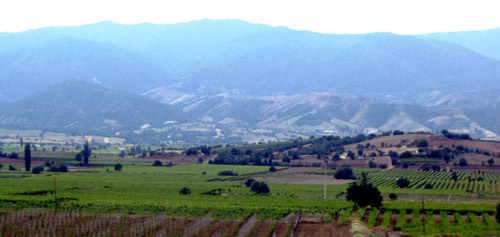
Philadelphia Vineyard (David Phillips)
Rev 3:7 “And to the angel of the church in Philadelphia write: He who is holy, who is true, who has the key of David, who opens and no one will shut, and who shuts and no one opens, says this”
 How is Jesus described to this church? Holy, true, has key of David, opens doors no one shuts/shuts & no one opens.
How is Jesus described to this church? Holy, true, has key of David, opens doors no one shuts/shuts & no one opens.- What does he know about them? Their deeds
- What is missing from the structural formula? There is no contrast, Jesus has nothing bad to say about this church.
Holy – “All through the Old Testament God is the Holy One; and now that title is given to the Risen Christ.” (Barclay)
He who is true – There are two greek words for true alethes (G227 – sense of true vs false) and alethinos (G228 – sense of real vs unreal). This happens to belong to the latter category, so it’s saying he’s real, that Jesus is reality, not a figment of our imagination.
“…Key of David…” David = King of Jerusalem. King’s key = like the master key. A key is a symbol of authority. Jesus has final authority no one else can question.
|
Application: When Opportunity Knocks… |
| Jesus has a master key that can open and close doors of opportunity in your life. If God shuts the door, its closed, no one can change that. If God opens the door, no one can close it on you.
Hold onto God-given opportunities; they may only be there for a season. Grab the door, hold it, walk through it, and utilize it. Don’t develop a habit of never taking opportunity (inertia). Grabbing one opportunity may close the door on others; it puts you on a new road. And when you turn around that door is probably not there anymore. Going through the right doors is not about having the best options. Often times walking through a door of opportunity will put you in tough places where you have to hold onto your God given opportunity. Its not something you have to DO, all you have to do is hang on. |
Positives: Deeds, Kept Word, Not Denied Jesus. Negatives: None.
Rev 3:8 “I know your deeds. Behold, I have put before you an open door which no one can shut, because you have a little power, and have kept My word, and have not denied My name”
Has a substantiation:
| Cause | Effect |
|---|---|
They have:
|
there is a door open in front of them that no one can shut. |
Implication: Supernatural opportunity doesn’t take a lot of power. Amazing opportunity only requires a little power (not a lot), requires keeping His word, and not denying His name. Just because God does a great work in someone does not mean they are great. You don’t need to be great to have great opportunity. Great opportunity is not based on the greatness of the individual. Jesus is the one who opens and closes the doors or opportunity.
One thing worth noting is that in early greek manuscripts, there was no punctuation, so it is possible that the list of reasons can be both applied to what comes before (the dors being open) or what comes after (those of the symagogue of Satan will bow down to them), likely both.
Therefore: False Believers will Bow Down
Rev 3:9 ~ “[![]() ] Behold, I will cause those of the synagogue of Satan, who say that they are Jews and are not, but lie–I will make them come and bow down at your feet, and make them know that I have loved you.”
] Behold, I will cause those of the synagogue of Satan, who say that they are Jews and are not, but lie–I will make them come and bow down at your feet, and make them know that I have loved you.”
Those of the synagogue of Satan (who say they’re Jewish but aren’t, they lie) will be made by God to come bow down at your feet and know that God loved you.
The synagogue of Satan called themselves God’s people (Jews/Israel), but they aren’t.
Implication: The synagogue of Satan lies about their identity. Calling yourself one of God’s people doesn’t make you one. It’s something that’s proven, not spoken. Are you proving yourself to be one of God’s people, or are you one in name only? The words someone speaks should not be used as a basis to assume they are in fact a believer; even the Synagogue of Satan makes claims to be God’s people.
The promise in this verse: God will make your enemies bow down and know how much God loves them.
Implications:
- GOD will fight your enemies, you don’t have to.
- They have little power, but the synagogue of Satan has NO power (they are the ones bowing down, they don’t have authority or power in that position). Satan has no power over us. Jesus loves us (and will show us).
Therefore: Be kept from the hour of testing
Rev. 3:10 ~ “Because you have kept the word of My perseverance,![]() I also will keep you from the hour of testing, that hour which is about to come upon the whole world, to test those who dwell on the earth.”
I also will keep you from the hour of testing, that hour which is about to come upon the whole world, to test those who dwell on the earth.”
(Cause) Because you’ve kept the word of perseverance,
(Effect) you’ll be kept from the great tribulation.
- You can have confidence you can be kept from this (by keeping the word as the basis for everything you do)
- A real child of God will persevere in living a life of following God’s word (all of it, not just the convenient parts).
“…be kept from the hour of testing on whole world…”
(Note that we will see hour of testing again in the next segment)
Implication: They’ve already passed the test. If you life like the world, you’ll have to retake the test. You can have your severity now or later, wouldn’t you rather take the pre-test?
Notice that there is no middle ground here either. In keeping the word of perseverance, don’t get deceived into what is cultural; the world will never set a standard this high.
Word of perseverance: Living according to the word (hard/godly) <– ![]() –> World/Satan’s ways (easy life)
–> World/Satan’s ways (easy life)
We don’t take God given opportunities sometimes but devil-given opportunities sometimes.
“…hour of testing which is about to come upon the whole world…”
The great tribulation = global event.
 Therefore: Hold Fast That No One May Take Your Crown
Therefore: Hold Fast That No One May Take Your Crown
Rev. 3:11 ~ “I am coming quickly; [![]() ] hold fast what you have,
] hold fast what you have, ![]() so that no one will take your crown.”
so that no one will take your crown.”
What does the church have? little power, kept my word, not denied my name. What should we do with that? Hang on to it.
Implications:
- (Hold fast) There are forces actively trying to pull what you have out of your hand. You are in a hostile environment. Are you holding fast to the truths that you know and to Jesus’s name in spite of the enemy trying to steal your victory? Or are you letting the enemy win?
- It’s not about salvation but about the crown.
To Overcomers: Be a Pillar in God’s Temple
Rev. 3:12a “(To) he who overcomes, I will make him a pillar in the temple of My God, and he will not go out from it anymore;”
Reward to he who overcomes? Be a pillar
What are they overcoming? Losing their grip on what they know is right and true.
Pillar = A pillar is something that is used for support, something that is structurally sound. You get to be something that supports the weight of the temple of God, something of strength that holds other people up in God’s house.
| Application: Are You a Leaner or a Lifter? |
| There are leaners and there are lifters in God’s kingdom, which are you? Are you built up so that you can support the weight of holding other people up in God’s house.
Strive for Longevity Don’t be a temporary pillar in God’s kingdom, used only to support the permanent pillars while construction is done. Hold on and be a pillar for the long haul. Be a permanent fixture in God’s kingdom. There will be a season in your life where you are no longer under construction, where you’re just serving, and all you have to do is just stand and keep doing it. Example: Billy Graham might be a pillar no longer “under construction” |
3:12b “and I will write on him the name of My God, and the name of the city of My God, the new Jerusalem, which comes down out of heaven from My God, and My new name”
Name written: When God writes his name and address on you, you belong to him. Think about what you write your name on as kids: Everything that is yours. God gives you an identity of being his. He marks you as his own, undeniably God’s. Hold on for your whole life and then for eternity you are His.
Rev 3:13 “He who has an ear, let him hear what the Spirit says to the churches.”
Big Idea: ![]() Philadelphia should be holding fast to Jesus.
Philadelphia should be holding fast to Jesus.
Take the little power you have and focus it on Jesus. Put your energy into your relations with Jesus, he takes care of everything else.
Laodicea (The Lukewarm Church) [Rev. 3:14-22]
This church has the distinction of being the only one that Christ had nothing good to say about it.
Laodicea was a walled city in a valley to the east of Ephesus, on the route that eventually leads to Syria. Originally the city had been a fortress, but the awkward position of having all its water come from underground aqueducts from springs no less than six miles away left it vulernable to seiges. Laodicea was a great banking and financial center, one of the wealthiest in the world, as well as thriving clothing manufacture and medical industries. It’s medical school was famous throughout the world for ear and eye ointments. Ironically, while the city was visionary in taking care of physical eyes, it was spiritually blind. The city also had a large Jewish population.
Meaning of Laodicea? “Take note that the address is not to the church at Laodicea, but to the church of the Laodiceans. The Greek word laos, from which we get our word “laity,” means “people.” Diece means “decision” or “rule.” Thus, the church of the Laodiceans was directed by the people rather than guided by the Lord.” (Courson)
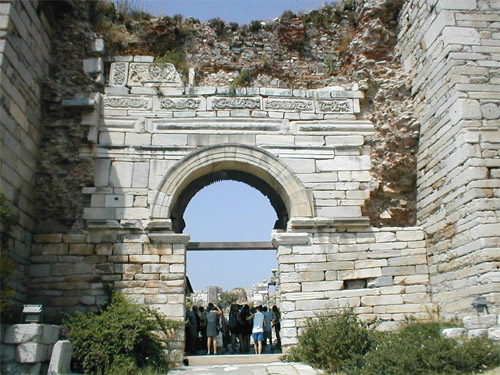
Laodicea (Cornerstone Arts)
“To the angel of the church in Laodicea write: The Amen, the faithful and true Witness, the Beginning of the creation of God, says this:” (2:14)
v. 14: How is Jesus described?
- The amen
- faithful and true witness – the word for witness here is Martus (yes, like Martyr). “What is a witness? One who lives so much like Jesus Christ and is so in love with Jesus Christ that he ends up being crucified even as Jesus Christ was crucified.” (Courson)
- beginning of the creation of God
witness in Greek = martus (sp?), someone willing to die as a witness
 Negatives:
Negatives:
They are not Extreme
“It is thought that the Laodiceans were being critiqued for their neutrality or lack of zeal (hence “lukewarm”). […] However, some scholars have suggested that this metaphor has been drawn from the water supply of the city, which was lukewarm, in contrast to the hot springs at nearby Hierapolis and the pure water of Colossae (Barclay). The archaeology shows Laodicea had an aqueduct that probably carried water from hot mineral springs some five miles south, which would have become tepid before entering the city. Strabo states that the water was hard, though drinkable. The imagery of the Laodicean aqueduct suggests not that “hot” is good and “cold” is bad, but that both hot and cold water are useful, whereas lukewarm water is useless. ” -wikipedia
“I know your deeds, that you are neither cold nor hot; I wish that you were cold or hot.” (3:15)
missing: contrast -> this church is not condoned only condemnation.
v. 15: What does Jesus know about this church?
- Their deeds
- neither hot nor cold (lukewarm)
- I wish you were hot or cold
“Cold is psuchros (<G5593>); and it can mean cold to the point of freezing. Ecclesiasticus (Sirach 43:20) speaks of the cold north wind which makes the ice congeal upon the waters. Hot is zestos (<G2200>); and it means hot to boiling point. Tepid is chliaros (<G5513>). Things which are tepid often have a nauseating effect. Hot food and cold food can both be appetizing, but tepid food will often make the stomach turn.” (Barclay)
“In Laodicea’s sister city of Hieropolis were hot springs—from which the present-day Turkish government is trying to extract geo-thermal power. To take advantage of this, an aqueduct was constructed that carried the hot water from Hieropolis through Laodicea and on to Colossae. In theory, it was a good idea. But in reality, by the time the water reached Laodicea, it was lukewarm. Thus, as lukewarm water flowed through their city, the Laodiceans would know hot water was useful, cold water was refreshing, but lukewarm water was not good for much.” (Courson)
“So because you are lukewarm, and neither hot nor cold, I will spit you out of My mouth.” (3:16)
v. 16: What is the effect of (cause) being lukewarm? Jesus spits them out of His mouth
Jesus wishes they were hot or cold
– he is not calling cold a negative
– he is saying: be extreme (lukewarm is balanced)
vomiting: complete revoltion…its repulsive, like George drinking water with 2-3 inches of mold on its top. Being cold or hot -> implied: both are good things, there’s no use for lukewarm. Be extreme. Because you are well-balanced (perfect balance of hot and cold) I’m going to SPIT you out (word is like vomit) connotation: revulsion to what has been in mouth. There’s no radical-ness to them anymore (passion, commitment)
Their perception does not match reality
“Because you say, “I am rich, and have become wealthy, and have need of nothing,” x and you do not know that you are wretched and miserable and poor and blind and naked” (3:17)
v. 17-18: They think they are rich, but they are really miserable, poor, blind and naked. They are advised therefore, to buy heavenly riches.
their impression of themselves is they think they’re rich, not in need -> A sense of adequacy leads to complacency. (if ever there was a description of the church of America…) Normal sense with the Kord (not desperation), no urgency. When’s the last time you prayed to be heard? (and not just to pray). Jesus says: they’re not, and they don’t see it.
You do not know… -wretched -miserable -poor -naked -blind
Their perception: they don’t know the truth about themselves. Most people think about someone else when they read this. If you think that you are in the same boat as the Laodiceans -> good possibility you are lukewarm. If you don’t say you can’t do anything (without Jesus) you are the church of Laodicea. If you don’t need Jesus, you wouldn’t need to be extreme. Being radical threatens the status quo, take the veil off deception.
 Advised: Buy Jesus’s Gold, White Garments, Eye Salve
Advised: Buy Jesus’s Gold, White Garments, Eye Salve
“A popular eye medicine known as “Phrygian powder” was one of Laodicea’s sources of wealth. The medical school at Laodicea was famous for the preparation and use of this eye salve…According to Strabo (12.8.20) there was a medical school in the city, where a famous ophthalmologist practiced. The city also lies within the boundaries of ancient Phrygia, from where an ingredient of eye-lotions, the so-called “Phrygian powder”, was supposed to have originated.” -wikipedia
3:18 ![]() I advise you to buy from Me
I advise you to buy from Me
gold refined by fire ![]() so that you may become rich,
so that you may become rich,
and white garments ![]() so that you may clothe yourself, and that the shame of your nakedness will not be revealed;
so that you may clothe yourself, and that the shame of your nakedness will not be revealed;
and eye salve to anoint your eyes ![]() so that you may see.
so that you may see.
“I advise you to buy from me” Who is speaking? Jesus. When Jesus advises, the wise listen.
Advice:
1. Buy Gold from Jesus -> means offer your life/self (that’s all you have to offer) in exchange for what’s truly valuable. Expend your life on what’s truly valuable. Jesus counsels ( pay attention anytime Jesus counsels): BUY from ME…
There is a mixture of spirituality and carnality in their lives.
- Are you expending your life on what’s truly valuable?
- Buying from Jesus: this is what will cause you to be extreme.
- Where are you going for your sense of richness? Is it to Jesus?
Buy From Jesus (Rev. 3:18)

2. white garments -> Buy “clothes”, cover yourself with the righteousness HE gives. What are you clothing yourself in? (putting around your life) image you are seeking.
“Laodicea prided itself on its clothing trade. The garments made there were famous over all the world, and the wool of the sheep of Laodicea was a luxury article which all men knew, But, says the Risen Christ, Laodicea is spiritually naked; if it wants really to be clothed it must come to him. The Risen Christ speaks of “the shame of the nakedness of Laodicea… In the ancient world to be stripped naked was the worst humiliation…On the other hand, to be clothed in fine raiment was the greatest honour. ” (Barclay)
3. eye salve -> To See the real truth, look past the deception, get something that will make you see. ( Laodicea was famous for its eye salve)
| Application: Where Do You Look? |
| Where do you get your insight into life? Magazines at the checkout stand? The culture? Who are you listening to? Dr. Laura? Some of her advice is junk, it will blind you, it is like throwing mud in your eyes. |
Look to Biblical Sources
Open your eyes to the truth. Look to places that will help you see clearly. Get Discipled. Find somewhere to look to that will train you so you see God’s truth clearly.
Paul didn’t get worse; he just got his eyes opened.
“Those whom I love, I reprove and discipline; ![]() therefore be zealous and repent.” (3:19)
therefore be zealous and repent.” (3:19)
v. 19: What is the causation? Be zealous and repent.
reprove = correct (has severity to it)
There is a temporary pain involved that gets your attention.
Internal causation: (v. 19) be zealous and repent. v 20 written to BELIEVERS (not for evangelism). This book is for THE CHUCH, not evangelism/unbelievers.
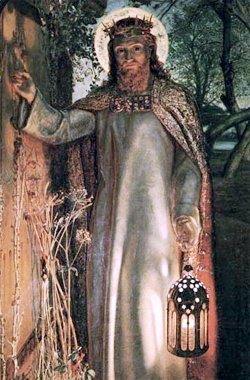 Rev 3:20 ‘Behold, I stand at the door and knock; if anyone hears My voice and opens the door, I will come in to him and will dine with him, and he with Me.
Rev 3:20 ‘Behold, I stand at the door and knock; if anyone hears My voice and opens the door, I will come in to him and will dine with him, and he with Me.
Jesus is on the outside, they’ve shut him out in their mediocrity.
He tries to get in (he knocks) but isn’t going to break in. If you open the door he dines with us -> you enter into the most genuine relationship with him.
v. 20: Jesus will dine with anyone who hears His voice and opens the door. Jesus is knocking.
To The Overcomer: Sit on the Throne
3:21 To him who overcomes I will grant to sit with Me on My throne, as I also overcame and sat down with My Father on His throne. 22 “He who has an ear, let him hear what the Spirit says to the churches.”
v. 21: What is promised to Him who overcomes?
What are they overcoming?
v. 22: He who has an ear…
I am rich… have need of nothing: attitude: we are great, fill, overflowing, at our high point, “it doesn’t get better than this” (self reliance, having enough).
Overcomers: sit with Jesus on his throne.
Overcome: tendency toward complacency
- you will always be tempted to be complacent
- church should be radical sharp and convicting word. not comfortable. Keep the church the vision Jesus had for it.
to those who overcome the lie that you don’t need to be extreme.
Would you just be a little more repulsive to Jesus please? It makes them uncomfortable because they’re not out there doing…
Big idea: ![]() Laodicea ~ be an extreme witness (to death, willing to go all the way)
Laodicea ~ be an extreme witness (to death, willing to go all the way)
Seven Churches Summary
Who Jesus is sets the standard for how the church (and church body) is/should be … (eg. sincere in love…).
Chart of the church’s highlights and lowlights:
|
Church |
What Jesus likes about them: |
What Jesus has against them: |
Essentially… |
Should Be… |
| Ephesus | Deeds, toil, perseverance | Left their first love | Loveless | Perfect in love |
| Smyrna | Tribulation | (no bad qualities) | Persecuted | Faithful in tribulation |
| Pergamum | Hold fast in tribulation, don’t deny Jesus’ name | Have bad doctrine mixed in (eg. eat food sacrificed to idols, commit acts of immorality) | Compromising | Accurate in doctrine |
| Thyatira | Deeds, love, faith, service, increasing greatness of deeds | tolerate Jezebel, immorality | Immoral | Zealous for purity |
| Sardis | Deeds, good name | You are dead | Dead | Spiritually Alive |
| Philadelphia | Deeds | (no bad qualities) | Faithful | Consistently biblical |
| Laodicea | (no good qualities) | Lukewarm | Lukewarm | Extreme |
Description of Jesus relating to Churches:
|
Church |
Description of Jesus |
Significance |
| Ephesus | The one who holds the seven stars in his right hand | Seven stars symbolize angels of each of the seven churches (Rev 1:20). God holds the angels in his right hand. |
| The one who walks among the seven golden lamp-stands | Heb 9 shows the parts of the tabernacle were symbolic of Christ. Lampstand of pure gold was in the Holy Place to give light and symbolized the Church. See also Rev 1:20 Num 8:2, Zec 4:2. | |
| Smyrna | The first and last | God exists outside of time, Jesus was there before creation and after. |
| Who was dead and has come to life | Speaks of Jesus’s Resurrection | |
| Pergamum | Has the sharp two-edged sword | “Heb 4:12 For the word of God is living and powerful, and sharper than any two-edged sword…”, Psa 149:6 Let the high praises of God be…a two-edged sword in their hand” |
| Thyatira | Eyes like a flame of fire | God made frequent appearances as a flame of fire in OT, flames consumed mountains and chaff and thorns and briars. See Isa 10:17, 43:2, Oba 1:18. God sees who is a believer and who is the chaff and the chaff will be consumed by fire. See Dan 10:6 |
| Feet like burnished bronze | Bronze withstands high temperatures. Bronze was used for the tools for the offering altar in the tabernacle/temple. See Dan 10:6 | |
| Sardis | Has the seven Spirits of God | See Rev 4:5, equated to the 7 lamps |
| Has the seven stars | See Ephesus, Angels of the churches | |
| Philadelphia | Has the key of David | See Isa 22:22. Whoever possesses this key can open doors no one can shut and shut doors no one can open. |
| Opens doors no one will shut | God’s will cannot be blocked by other people. | |
| Shuts doors no one will open | Jer 13:19 Captivity. | |
| Laodicea | Faithful and true witness | Jer 42:5, God is a fatihful and true witness to his plans of what will be. |
| The beginning of the creation of God | God was the beginning of creation |
Given to Overcomers:
|
Church |
To Him Who Overcomes |
| Ephesus | I will grant to eat of the tree of life which is the Paradise of God |
| Smyrna | Will not be hurt by the second death (but the first might…Get to have eternal life with Jesus instead) |
| Pergamum | Given: some of the hidden manna, a white stone, and a new name written on the stone which no one knows but he who receives it. |
| Thyatira | Given: Authority to rule over the nations, and the morning star |
| Sardis | Clothed in white garments, name will not be erased from book of life, Jesus will confess your name before His father and His angels |
| Philadelphia | Be made a pillar, permanent weight-bearing fixture, in the temple of God, God’s name, new name, and city written on you |
| Laodicea | Sit with Jesus on His throne |
